JOB ORDER ANALYSIS
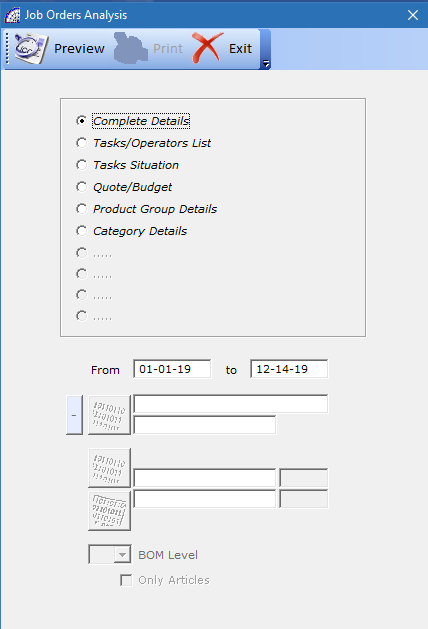
Manages specific reports on job orders. This module is aimed at data analysis and the listed reports are not included among those inserted directly in the window of the job orders itself.
Complete Details: a complete report summarizing the total values by type of record (warehouse articles, tasks and various descriptions). Provides a search filter by period, i.e. from date to date.
Tasks/Operators List: a report that for each operator involved in the job orders entered, displays a list of the tasks that are subdivided by work center. It also analyses used or estimated times and consequent costs. Provides a search filter by period, (from date to date) and by work center and operator.
Tasks Situation: a report where for each job order displays only the list of the tasks (if any is present), indicating the data related to the quote and the final balance in detail, as well as the comparison rates in time and cost. Provides a search filter by period, (from date to date) and by work center and operator.
Quote/Budget, Product Group Details, Category Details: are other special reports made available to represent the data of existing job orders.
PRINTS +++
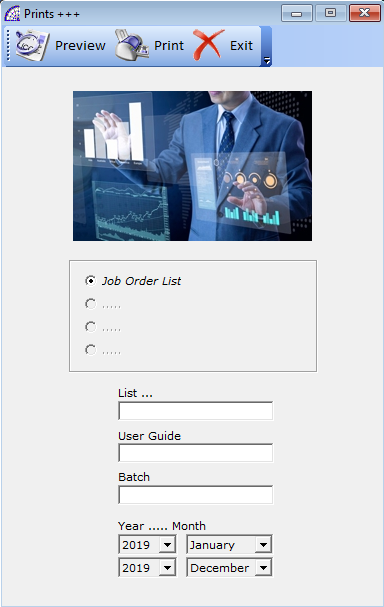
Displays a summary list of job orders that meet the set search criteria: List, User Guide, Batch, as well as by the period of time (from year to year or from month to month).
JOB ORDER MONITOR
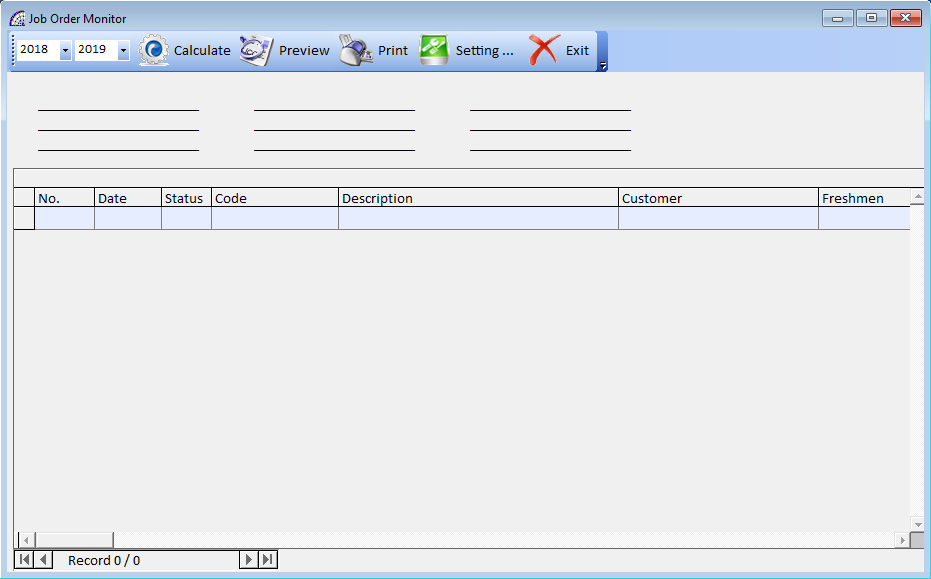
It is a useful tool to manage the various job orders uploaded, even if belonging to different years. All into a single window and with the availability to search through specific customizable fields, as well as to displaying them individually.
There is an external configuration file dedicated to the specific management with a defined record layout. This allows you to choose which fields to display and for each one, if it is necessary, you can define the search conditions.
The configuration file (Ascii format) is as follows: \ArproW\Condivisa\DittaXXX\CommesseMonitor-US.ini; saved on the server computer in the case of a shared network.
Contact qualified personnel for any needed customization.
The system is connected to a dedicated database, separate from the original data ones; in this context, it is possible to import the job orders by indicating the two reference years and then these data can be consulted over time in a detached way (offline).
After selecting 2 years, when it is necessary to update the data, press the button to recalculate. The latter is active only if the reference period has been changed and as long as it has not been pressed already.
Preview: allows to open a view (it is not possible to make changes to the data, considering the offline mode), on the selected job order. The displayed detail shows some head data and document body records.
allows printing of a preview displayed.
it is necessary to press this button only in case it is necessary to recreate the support database (offline), naturally clearing the data contained in it. This is usually an operation carried out when some parameter has been changed in the configuration file described above. Used to restore the whole structure.
Print: allows printing of a preview displayed.
Setting: it is necessary to press this button only in case it is necessary to recreate the support database (offline), naturally clearing the data contained in it. This is usually an operation carried out when some parameter has been changed in the configuration file described above. Used to restore the whole structure.
PRODUCTION SHEETS
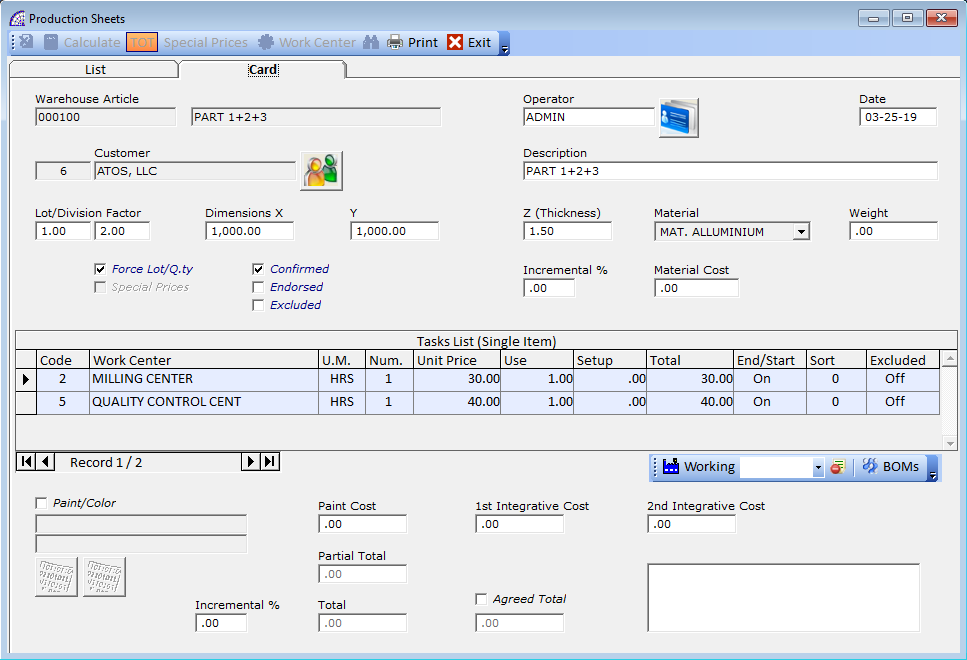
View a list of specific production cards, linked to warehouse items, with technical and production data: article, customer reference, description, lot/division factor, dimensions, material, weight, tasks list, etc.
In this operational context it is not possible to create new cards, only from the individual warehouse items (from the main menu select “@/Arpro” + “Warehouse Articles” + “Card” tab + “Production Card” button in the bottom toolbar), an article can contain one or more tabs.
As already explained above, these production cards are transferred in the context of customer job orders if generated by the management “Scheduled Orders” (from the main menu select “@/Arpro” + “Scheduled Orders”).
Useful for calculating production costs related to specific calculation parameters: cost of materials, weight and dimensions used, possible painting costs, variable costs related to different production batches and costs of tasks.
Toolbar
![]() delete the selected production sheet.
delete the selected production sheet.![]() Calculate: force the recalculation of the displayed cards; it is possible to apply search filters to limit this operation. Anyways, this operation excludes the cards where the “Excluded” flag was activated (in the “Card” tab).
Calculate: force the recalculation of the displayed cards; it is possible to apply search filters to limit this operation. Anyways, this operation excludes the cards where the “Excluded” flag was activated (in the “Card” tab).
The recalculation operation affects the following sections:
- cost of painting (if any), obtaining the updated value from the data present in the master data (in the base program @/Arpro, select in the main menu “Master Data” + “Material Colors”);
- cost of material, obtaining the updated value from the data present in the master data (in the base program @/Arpro, select in the main menu “Master Data” + “Material Types”);
- recalculates the production sheet with updated data.
The updated production sheet, connected with changes in the raw material that follow market trends, can be used in the context of production job orders. Job orders already completed and executed will retain the previous and already input costs.
Special Prices: a dedicated system to transfer the recalculated cost values present in the various production sheets (the only ones displayed at the time of the operation), to the special prices section of the warehouse items (from the main menu select “@/Arpro” + “Warehouse Articles” + “Card” tab + “Special Prices” button on the bottom toolbar).
The single production sheet, in addition to the various detailed costs, previously discussed there are 2 fields present dedicated to the reloading values: one for the part concerning the cost of the material, defining the type and dimensions used, the other one to the underlying part of the tasks (including any painting).
These fields allow increasing the real cost values in sales values, it is also for the generation of special sales price lists reserved for the various customers involved.
The program displays a window where 2 operational choices are available: “Special Lists”, for the generation of special sales price lists upon cancellation of the existing ones; “Simulation” for the sole generation of the simulated price lists.
The latter differ from the others because the relative “Simul.” flag is active in the record (from the main menu select “@/Arpro” + “Warehouse Articles” + “Card” tab + “Special Prices” button on the central toolbar) and are not used by the program.
Another system to create customized price lists to customers, generating them from production sheets and not manually imputing them as done normally.
![]() the procedure opens a window where after inserting the work center reference (it is mandatory), for the only production sheets displayed, the program updates the relative task data.
the procedure opens a window where after inserting the work center reference (it is mandatory), for the only production sheets displayed, the program updates the relative task data.
If the production sheet contains the work center selected, the data will be updated with the ones entered in the window itself, otherwise the new task (work center) will be inserted in the list of existing ones.
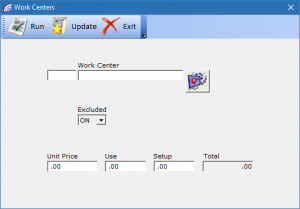
Run: allows you to execute the procedure, after entering the relative data: Work Center, Excluded flag, Unit Price, Use, Setup (they are the same fields in the body of the production cards).
Update: enable (if checked) or disable data update by pressing the button discussed above. In the second case, the program only performs a simulation, to verify that the data are congruent.
Card Tab
Warehouse Article: view the reference warehouse item, required for defining and creating the work sheet (from the main menu select “@/Arpro” + “Warehouse Articles” + “Card” tab + “Production Card” button in the central toolbar). An article may have multiple associated production sheets, usually divided by customer or production lot or order quantity.
Operator: displays the operator who created the production sheet (selectable from the master data).
Date: date of creation.
Customer: is another mandatory field, indicates the reference customer of the specific production (production sheet).
Description: free descriptive field.
Lot/Division Factor: they define the production lot and the division factor respectively, parameters to determine the costs of the single production sheet. Normally, the higher the value of the production lot the lower the cost of the single product (index adjusted by the division factor).
Dimensions (X, Y and Z): it is necessary to indicate the dimensions of the material used (for example sheet metal), where with the type of material selected the program determines the total cost.
Material: (mandatory field) allows you to select the type of material used, from the list available in the master data list (from the base program @/Arpro select “Master Data” + “Material Types”).
Weight: (mandatory field) allows you to insert the weight of the material used. It is also automatically calculated from the program, multiplying the values of the dimensions of the inserted material (“X”, “Y” fields), individually divided by 1000, for the thickness value (“Z” field), for the specific weight inserted in the selected material type,
Incremental %: it is possible to indicate the percentage value of increase (or reload) on the cost of the material, to determine the total one (“Material Cost” field). Often this increase value is necessary to compensate for material losses during processing and production activities.
Material Cost: total cost of the material.
Force Lot/Q.ty: if active, it conditions all calculations of the production sheet taking into account the value of the inserted lot value.
Special Prices: indicates if the production sheet has been transferred to the management of special prices, in the warehouse items. This flag is managed by the program, it is not possible to change its status.
Confirmed: if active, force the recalculation of the production sheet once closed. It is automatically managed by the program at every modification made in the various fields available.
Endorsed: it is a free field used to display any confirmation of the production sheet.
Excluded: if active, the program excludes the production sheet from the calculation.
Tasks List (Single Item): view the list of planned tasks, relative to the production of a single item or product or machinery.
For each task entered it is necessary to indicate the following significant fields: Work Center, selected from the button on the related toolbar, Use (expected work time), Setup (possible preparation time, before processing), End/Start (flag used to establish connections between tasks, for the Microsoft Project® program), Sort (to force a different sorting of the tasks), Excluded (to exclude from the calculation of the single task).![]() allows you to insert a single work center (task), chosen from the list of master data created (from the main menu select “@/Arpro” + “Work Centers”).
allows you to insert a single work center (task), chosen from the list of master data created (from the main menu select “@/Arpro” + “Work Centers”).![]() delete the selected work center.
delete the selected work center.![]() it allows you to insert the work centers (tasks) of a BOM selected from the list.
it allows you to insert the work centers (tasks) of a BOM selected from the list.
Paint/Color: if active, it allows the insertion of 2 different types of painting that can be used, chosen from the list of master data created (from the base program @/Arpro, from the main menu select “Master Data” + “Material Colors”).
By entering this data, the program transports the individual costs present in them to calculate the “Paint Cost” field; multiplying the values entered in the dimensions (“X” and “Y” fields), divided in turn by the fixed value 1000, for the cost defined for the single painting master data.
1ST and 2nd Integrative Cost: free cost fields.
Partial Cost: partial total (not modifiable) calculated by the program.
Incremental %: (optional field) overall incremental value to define a sales value, compared to a total cost per individual component. The value entered influences the calculation of the “Total” field.
Agreed Total: if active, enable the field below to enter a total value agreed with the customer.
The program provides a field on the side to insert any technical notes relating to the selected production sheet.
